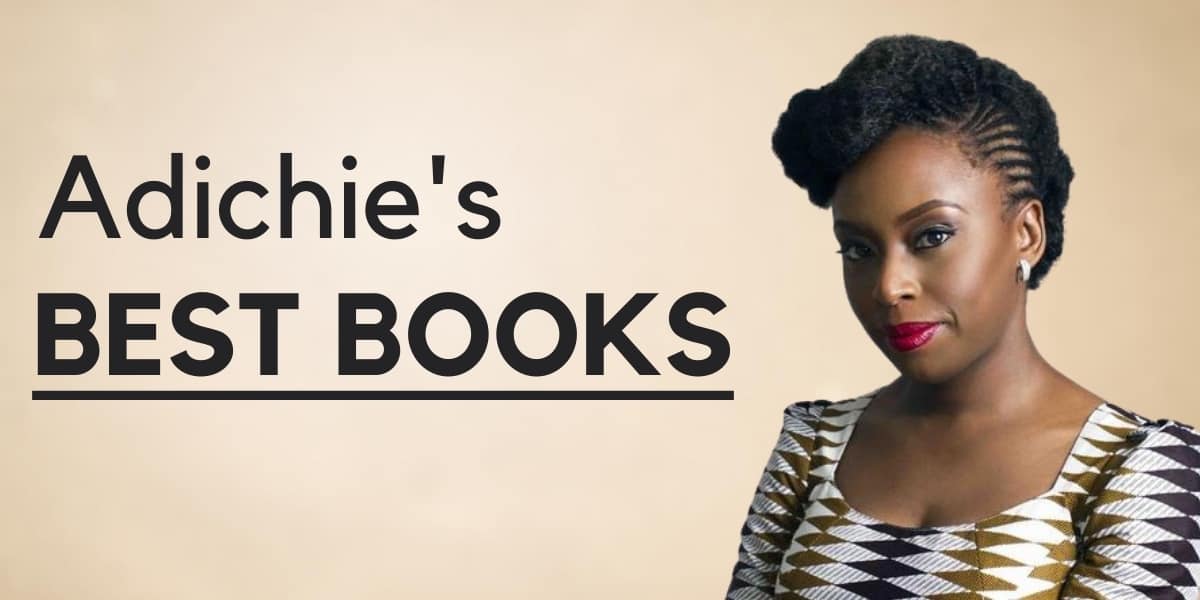At A Glance: Our Top 5 Picks for Chimamanda Ngozi Adichie Books of All Time:
- Half of a Yellow Sun – Our Top Pick
- Americanah
- Purple Hibiscus
- The Thing Around Your Neck
- We Should All Be Feminists
All over the world, libraries and bookstores have fully stocked shelves of well-known books by American and British authors, some even depicting African adventures.
Until recently, the opposite wasn’t true: African literature by an African writer was almost unheard of.
Growing up on Enid Blyton’s books and accepting all the words and concepts that were foreign to her, Nigerian writer Chimamanda Ngozi Adichie decided Africans can write their own stories about their own cultures.
In this article, we’re going to take a look at some of the best books written by the 42-year-old Adichie. The Nigerian author’s books provide an authentic look at Africa, written from an African perspective rather than a Westerner’s imagination of what that is.
Best Chimamanda Ngozi Adichie Books of All Time
Providing African immigrants with stories that reflect their journey and offering Westerners an enlightening look at what Nigerian culture really is, Adichie has successfully challenged the widespread notion that the Western story is the only recipe for literary success.
Here’s a look at Adichie’s best books.
| IMAGE | PRODUCT | FEATURES | PRICE |
|---|---|---|---|
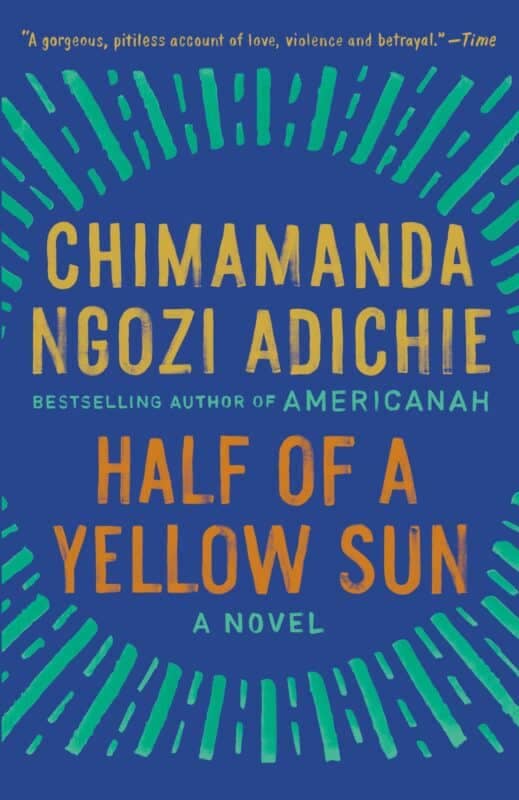 | Half of a Yellow Sun | • Formats: Kindle, Audiobook, Hardcover, Paperback and MP3 CD • Paperback: 543 pages | |
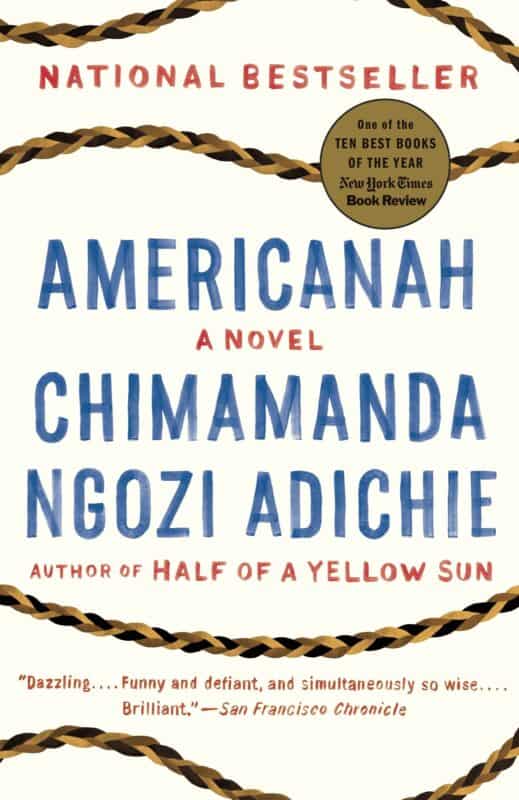 | Americanah | • Formats: Kindle, Audiobook, Hardcover, Paperback and MP3 CD • Paperback: 588 pages | |
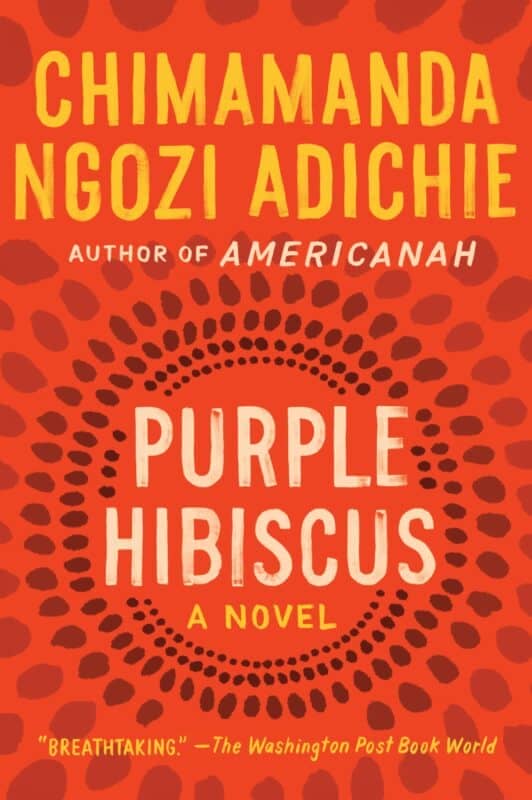 | Purple Hibiscus | • Formats: Kindle, Audiobook, Hardcover, Paperback and MP3 CD • Mass Market Paperback: 320 pages | |
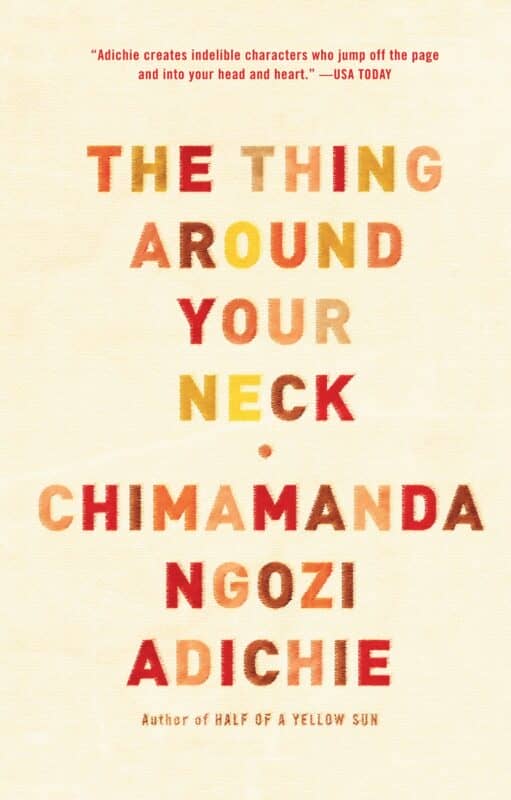 | The Thing Around Your Neck | • Formats: Kindle, Audiobook, Hardcover and Paperback • Paperback: 240 pages | |
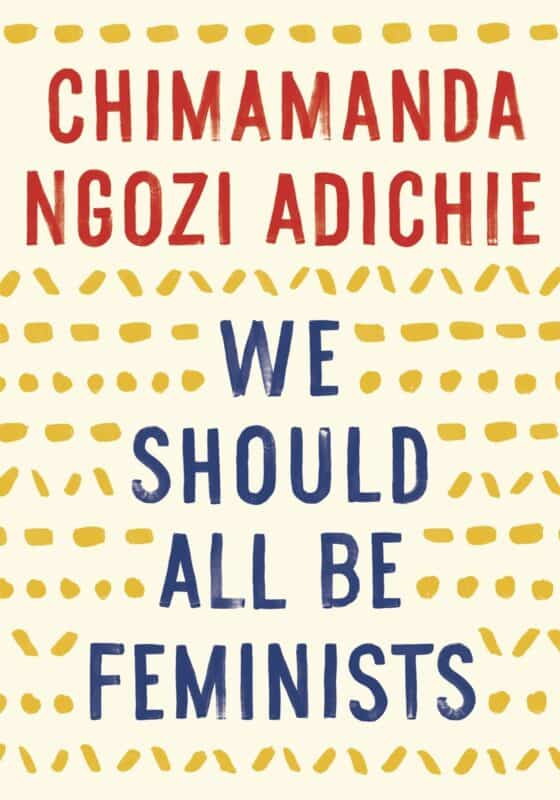 | We Should All Be Feminists | • Formats: Kindle, Audiobook, and Paperback • Paperback: 64 pages | |
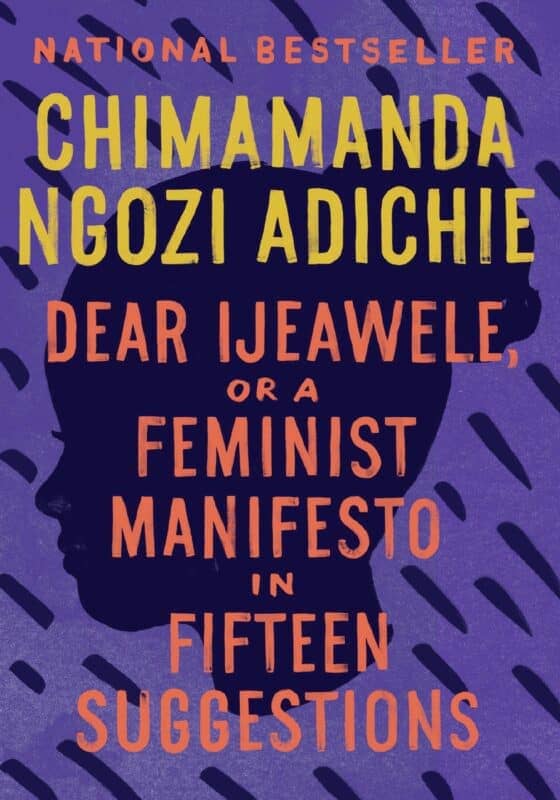 | Dear Ijeawele, or a Feminist Manifesto in Fifteen Suggestions | • Formats: Kindle, Audiobook, Hardcover, Audio CD & Paperback • Paperback : 80 pages |
1. Half of a Yellow Sun
In this historical fiction masterpiece, Adichie sheds some much-needed light on a major event in modern African history without turning the story into a dry history lesson. The event in question is Biafra’s fight for independence in the late 1960s.
Doesn’t ring a bell? Fear not: You don’t need to know about the Nigerian civil war to be able to enjoy this book. You may start reading with zero knowledge about the Biafran war and Nigeria itself, but you’re going to emerge feeling as though you lived those seminal years.
The story unfolds through five memorable characters who take us into Biafra’s sweet dreams of independence. The hopes and yearnings are palpable, and so is the crushing sense of loss as Adichie deftly dismantles the dream slowly, echoing the actual Biafran experience.
Literary-wise, Adichie is at the top of her game here, painting starvation and torture vividly enough to make you feel every bite of hunger. She peppers the powerful prose with well-researched historical facts without once info-dumping.
Adichie’s masterful use of words comes into its own in Half of a Yellow Sun. The language may seem deceptively simple at first until about the third time Adichie’s imagery kicks you in the guts and leaves you breathless.
Not a light read by any means, this unforgettable book depicts war, genocide, and the horrifying aftermath on those who lived through the Biafran war.
You’ll walk away with more than just wistfulness over Biafra’s failure: A visceral longing for the outcome to have been anything but what it was.
2. Americanah
This novel follows Ifemelu and Obinze, two Nigerians in love and full of hope for a future outside Africa. They leave military-ruled Nigeria for the West, where they face what it means to be black and start an unfathomable separation that leaves each changed forever.
If you know nothing about Nigeria or Nigerians, so were most of the lovers of this easy-to-read novel. Don’t let that make you miss out on this memorable read: You don’t need to know anything about Nigeria to read this. Leave that to Adichie.
With well-fleshed-out characters, lyrical prose, and a thought-provoking story, this book will take you on Ifemelu and Obinze’s rocky journey as they navigate America, deal with their shock at how Americans perceive them, and survive growing apart and growing up.
In a book teeming with moving depictions of racism and identity, Adichie gifts us with a poignant moment about storytelling itself: Ifemelu, the beautiful young Nigerian woman, is frustrated when an American white woman asks about the book Ifemelu is reading.
Ifemelu’s answer is something many bookworms will relate to: She wonders why people ask what a book is about, “as if a novel has to be about only one thing.”
An honest book that doesn’t try too hard to be smart or literary, Americanah is written in a refreshingly straightforward manner. Despite the cultural divide, the characters are still relatable because they’re humans who make mistakes and feel regret.
Rather than yet another attempt to attack each and every problem in society, this must-read book is more of a human story. The fact that the humans here come from an exotic land only adds to the richness of this beautifully written story.
As old as the African immigrant experience is, Adichie’s book is a first in telling it from the perspective of an African, starting the story in Africa and taking the characters from their homeland to the US and back.
3. Purple Hibiscus
This well-written novel follows Kambili, the 15-year-old narrator. She grows up in a strict, privileged family with a violent father, and we watch her come of age as the story unfolds.
Adichie’s very first novel offers an insightful look into the lengths many Africans will go to in order to live by Western laws, in this case the British colonial influence. It shapes the way the family lives, enough that they won’t even speak Igbo at home.
Kambili’s spirituality is a big part of Purple Hibiscus, and the different interpretations of faith will stop you in your tracks and make you think. Faith to Kambili’s father means an absolute set of rules that define life, while it means different things to Kambili and her grandfather.
Definitely more literary than Adichie’s other books, this novel is packed with metaphors and personifications, but that doesn’t turn it into an English lit class. With vivid characters and a good plot, Adichie’s storytelling comes with a beautiful style that evokes exotic Nigerian imagery.
Through Kambili, Adichie brings to life a struggle very few in the Western world know: The postcolonial identity, or living a dual life, never fully free from your own African roots, never completely part of the colonial influence you believe sets you apart from your countrymen.
4. The Thing Around Your Neck
In this book, Adichie offers 12 captivating stories that will pluck you from the world you know into another you’re probably unfamiliar with. A heartfelt look at the ties that bind, these stories are treacherously hard to put down.
Adichie has a true knack for writing concentrated stories that come fantastically alive in a few words. If you find yourself wondering how you care so much about a character you only met two paragraphs ago, you’re not alone!
Different yet flowing seamlessly under the same theme, the stories here are easy to read, believable, yet pack a powerful emotional punch. Each story offers a fresh view into Nigerian culture and way of life, both in Nigeria and abroad.
With stories like African people’s perception of each other at a writing retreat, this book delves into a fundamental question: Are non-Western stories worth telling if they don’t stick to the well-known Western perspective?
If you think the answer is an obvious and resounding yes, take a moment to think of the number of African writers you know who wrote about life in Africa. Less than a handful? That’s exactly what Adichie deftly tackles here.
Another reason this book is so enjoyable is the supporting characters: Rather than flat and one-dimensional, they are real enough in their own right. What makes them more believable is how they echo real life: Some fail while others win, and they will all haunt you.
Don’t expect closure from all the stories in The Thing Around Your Neck, but each and every one is worth a read and will definitely leave you craving more.
5. We Should All Be Feminists
Originally a TEDx talk, this book is a reproduction of Adichie’s speech and a great look at the emotionally fraught topic of gender equality. However, this isn’t your average almost anti-men sentiment, so don’t let the title put you off.
Unlike many other feminist materials, this isn’t boiling with rage at men. Instead, Adichie talks about dignity and chances of being equally available for women as well as men. The book is rooted in positive points rather than anger, and the polished language flows effortlessly.
Adichie discusses the sort of sexism that’s so deeply ingrained it’s everywhere. She doesn’t try to make it into a Bad American thing, instead of sharing many of her own struggles with sexism in her own homeland as well.
This is an excellent eye-opener for women who may be tearing themselves down without realizing it every day. It’s also an excellent read for men as Adichie explains the subtle ways gender divides still stand in women’s way.
Rather than demanding a new nationwide set of rules for life, relationships, and work, however, the book has great suggestions on feasible changes that can actually make a difference in your own life.
Because We Should All Be Feminists was originally a speech Adichie gave, you’ll probably find yourself going through the whole thing in one go and wishing there was more.
6. Dear Ijeawele, or a Feminist Manifesto in Fifteen Suggestions
When Adichie’s friend gave birth to a baby girl, she wrote to the author asking for tips on raising a feminist daughter. Adichie wrote this book as a reply. The 15 suggestions in this manifesto are straightforward yet powerful enough to stop you in your tracks and make you think.
Adichie offers ways to avoid passing down the problematic thinking you were raised on to your children. It doesn’t stop at admitting that socializing children is no easy feat but also offers wise advice on the matter.
The writer challenges what is commonly agreed on as feminism and insists that empowering women can take different forms. One great example is how deciding to stay with a man who cheats can be a feminist response if it’s in the right context.
In addition to her fantastic advice, Adichie includes a few women in the book as exemplary feminists. You might find yourself googling them later, which provides yet another great source for valuable information on how to live as a true feminist.
Adichie tackles the idea of letting your child choose. This is an incredibly important point that encompasses what children are allowed to play with all the way to their career choice: Girls can play with trucks, boys can play with dolls, and pink and blue are not gendered colors.
Although written for a mother, this is a book for everyone. Use it as an opportunity for some quiet introspection to realize the ways misogyny sneaks into your thinking to beat you down, or read it to your partner to help him understand your reservations about taking his name.
The delicious snark in Dear Ijeawele, or a Feminist Manifesto in Fifteen Suggestions is sure to make you smile in compassion, and you might find yourself reading a few age-appropriate parts to your own daughter or niece.
That said, this book is absolutely suitable for parents of boys as well. If men’s misconceptions are the reason behind many hurdles women face, raising a feminist boy is the ultimate feminist contribution to the fight.
About Chimamanda Ngozi Adichie
She has an Orange Prize, a MacArthur Fellowship, and the National Book Critics Circle Award under her belt. Her TED talk, “The Danger of a Single Story,” has been viewed over 18 million times. Her TEDx talk, “We Should All Be Feminists,” was sampled in a Beyoncé music video.
But perhaps what’s most remarkable about the 42-year-old Adichie is her success where very few of her fellow Africans have: Writing stories about Nigerian culture and the African-American immigrant experience that have taken the West by storm.

Conclusion
If you want to immerse yourself in a fresh look at African literature, written from an African perspective by an actual African, the books of Chimamanda Ngozi Adichie are the best place to start.
For a delicious multiple-story treat, start with her short-story collection, The Thing Around Your Neck. The restrained writing only adds to the enjoyable prose and vivid characters.
Americanah is a beautiful, moving story that features a poignant look at racism with simple language and a fast-paced plot. But if you pick Half of a Yellow Sun, the unforgettable historical fiction about the Biafran war, keep a box of tissues handy. You might shed a tear or two.



